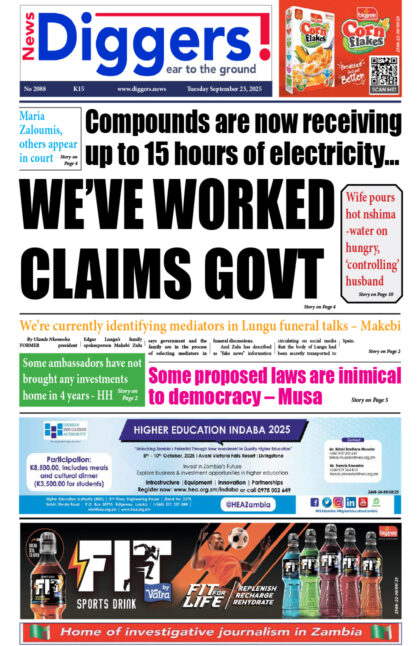ECONOMIST Trevor Hambayi says the kwacha will depreciate further due to government’s excessive debt servicing requirements next year, which will accelerate its slide against major currency convertibles.
In an interview, Hambayi observed that the kwacha would likely continue depreciating against major currency convertibles because of government’s need to service huge debt repayments, which would sustain pressure on the local currency.
He observed that a debt repayment plan was missing in the 2021 national budget, which ought to have made clear how government would address debt servicing, while keeping a lid on the widening fiscal deficit.
“Going forward, where we are is what we see from our (2021) budget that currently, we have a budget deficit of 11.4 per cent. If you look at the budget, there is nowhere we have put anything that speaks to reducing our debt position or even creating a debt repayment strategy that speaks to us having to reduce our debts. So, all the fundamentals that speak to having to hold the exchange rate now have all been breached and going forward towards the end of the year, what you will see is that the kwacha will continue to depreciate because we have nothing that supports the strengthening of the kwacha; whether we are talking about increasing our export earnings or reducing our budget deficit or, indeed, strengthening our foreign exchange reserves,” Hambayi said.
“We also do not see where the growth in the economy is going to come from, that is going to speak to holding the exchange rate. So, what we generally expect is that any increase in pressure on the exchange rate in terms of going towards the end of the year, if the economy starts to pick up, this will put pressure on the exchange rate and it will continue to depreciate. The kwacha will continue to depreciate and the exchange rate will rise. This is because all the fundamentals, really, are speaking to the negative; there is nothing that is positive that can speak to having to contain the depreciation.”
He added that the request for the deferment of the Eurobond interest debt repayments had also played a part in the kwacha’s depreciation.
“The depreciation of the kwacha is on both accounts. But the initial one around the bondholders had come immediately the country made a request to the bondholders. You saw a very sharp decline in the exchange rate at that time (post-September 22) because what it really meant was that the government was putting itself in a position of accepting the fact they are unable make the payments for the long liability, which in actual terms is a default and you saw that reaction in terms of the exchange rate,” Hambayi observed.
He explained that the bondholders rejected government’s request to postpone repayments because Zambia had no financial backing from the International Monetary Fund (IMF).
“In terms of the rejection of the bondholders to the postponement of the deferment of the interest payments of the Eurobond, from the outside, this was expected. The basic underlying factor as to why it was going to be a very difficult proposal, is in two accounts. The first account is that the bondholders, the first question they would have asked the country in terms of that proposal that will gave them was: ‘where will we find the resources to pay them in six months’ time if we postponed this?’ From our proposal, we did not seem to have given the bondholders an indication that what would change in our fiscal space to put us in position to be able to make the payment in six months,” Hambayi observed.
“The second aspect in terms of having to do this is that it was never going to happen without IMF support, in as much as having to go to the bondholders, the bondholders would have needed some form of comfort and that comfort would have only come from the IMF. If we had agreed on some form of a package with the IMF, the IMF would have agreed to say, ‘look, we will support you in balancing the payments, but what you need in the next six months are the following things…’ and at the end of that six months, the IMF will support you in making payments for these loan liabilities.”
According to the 2021 budget, K27 billion will be due to be spent servicing Zambia’s external debt alone, up from this year’s K21.1 billion allocation, representing 23 per cent of the total budget amount.
Domestic debt servicing equally increased to K18.3 billion next year, up from K12.6 billion allocated in this year’s budget.
The K119.6 billion budget is expected to be partly financed by domestic borrowing amounting to K17.4 billion and K34.2 billion emanating from external resources, representing 14.5 and 28.6 per cent of the total budget, respectively.
























